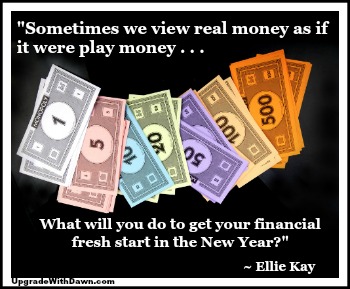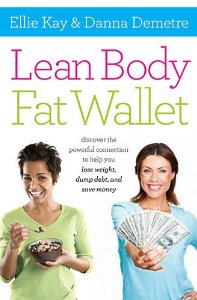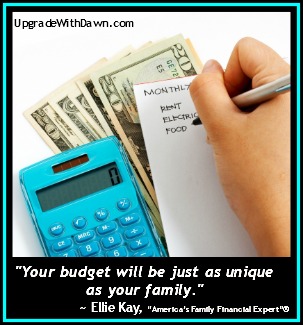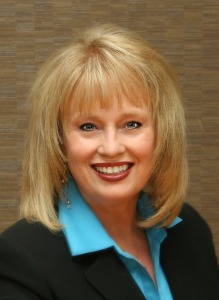A Fresh Start for Your Finances
Do your finances need a fresh start in the New Year? Ellie Kay, known as “America’s Family Financial Expert”®, is sharing a timely Financial UPGRADE today.
“After the holidays, most Americans face some pretty hefty credit card bills in January,” Ellie says. “In fact, it will take until May of this year to pay off the new credit card debt from the holidays and this doesn’t even include what debt may have already been on the card.”
“In fact, it will take until May of this year to pay off the new credit card debt from the holidays and this doesn’t even include what debt may have already been on the card.”
Been there, done that, and I (Dawn) have “financial scars” to prove it! I had to learn some wisdom from the Bible and practice good stewardship. (*See end of this post.)
Ellie continues . . .
It may seem like a game to juggle debt, but it’s one that you can win if you are determined to get a fresh start. Through the power of prayer and a desire to follow God’s wisdom in your finances, you can get the fresh start you desire.
As a child, I loved Monopoly®. I pretended all the play money was real—and mine! Sometimes we view real money as if it were play money.
When faced with the hard facts about their finances, many families go through five different stages—similar to the stages of grief: shock, denial, depression, anger and acceptance. Your fresh start is just on the other side of this journey.
1. Shock
Shock depends on what you believed in the beginning. For example, if a family already knew their total consumer debt load (credit cards, car payments, furniture loans, etc.) was around 40K, they would only be mildly shocked at how 40K in debt looks on paper. But another couple may think they are only a couple of years away from being debt free and they discover they are twenty years away. That kind of a severe shock can take time to absorb.
Use shock as a starting point to make better decisions. There are excellent budgeting and debt repayment tools at my website. I absolutely love the free Mint app.
2. Denial
Denial is not a river in Egypt. It is the most common stage in financial recovery. Continual denial makes people more likely to succumb to scams such as email phishing schemes or “Payroll Loans.” Once you face denial, you can overcome it.
Several red flags of financial denial include:
- Paying late fees
- Missing Payments
- Balancing or staggering bills, or
- A perpetual lack of cash.
Oftentimes, this stage will find you stuck—you are unable to reduce your debt, or if you do, you are soon back into debt again. There’s hope when you begin to follow God’s principles of good stewardship.
3. Depression
A series of money problems that press in can bring on financial depression characterized by:
- Lack of concentration,
- Insomnia,
- Guilt, or
- Hopelessness.
Consumer Credit Counseling Services is a non-profit organization specializing in debt reduction and financial education. A counselor can get credit card interest rates lowered, payments deferred, and help develop a plan to emerge from the debt depression cycle.
4. Anger
The anger stage is sometimes scary. Anger can be manifested through a wide range of emotions at a high intensity level. It can be as mild as being a grump or as severe as significant arguments.
At this point, some people even get mad at God and blame Him.
When the number one issue cited in divorce today is “finances,” it’s easy to see how couples in this stage end up in the “debtor’s prison” of divorce court.
Refuse to put your anger on someone else. Talk with someone—professionals, your pastor or church counselor. It helps diffuse feelings.
5. Acceptance
You’ll know you’ve reached this final stage, acceptance, when at least some of these elements are evident:
- Change – You discover what you need to change and you’re willing to make changes.
- Responsibility – You’ve stopped blaming someone or something else and have accepted responsibility for what you and your spouse did to contribute to your current financial status.
- Accountability – Besides mutual accountability, couples agree to make themselves accountable to another couple or financial counselor.
- Hotspots –You’ve identified hotspots where you’ve fallen short financially, and you purpose to avoid them through prayer and God’s help.
- Patience – You have hope. You are more tolerant of your own mistakes and have decided to learn from them.
Invite God into the equation. Through the power found in a relationship with Jesus, we can be more than conquers, even when it comes to our finances. Take it a day at a time and, in the future, you will be on the other side of this problem.
Then it will be your time to help someone else.
What will you do to get your financial fresh start in the New Year?
 Ellie Kay has been a regular expert on national television with ABC NEWS
Ellie Kay has been a regular expert on national television with ABC NEWS  NOW’s Money Matters and Good Money shows. Ellie is also a national radio commentator, a frequent media guest on Fox News, and CNBC, a popular international speaker, and the best-selling author of fifteen books including Lean Body, Fat Wallet (Thomas Nelson, 2014).
NOW’s Money Matters and Good Money shows. Ellie is also a national radio commentator, a frequent media guest on Fox News, and CNBC, a popular international speaker, and the best-selling author of fifteen books including Lean Body, Fat Wallet (Thomas Nelson, 2014).
* A few scriptures to apply wisdom from the Bible regarding finances (Proverbs 15:22; 21:5; 22:7; 27:12); and stewardship (Psalm 24:1a; Matthew 6:21; Luke 12:42-44; Romans 14:12).
 Post a Comment → Posted on
Post a Comment → Posted on  Tuesday, January 5, 2016 at 8:19AM
Tuesday, January 5, 2016 at 8:19AM  Debt,
Debt,  Ellie Kay,
Ellie Kay,  Finances,
Finances,  Financial Denial,
Financial Denial,  Fresh Start for Your Finances,
Fresh Start for Your Finances,  Stewardship,
Stewardship,  Upgrade with Dawn Upgrade Your Life
Upgrade with Dawn Upgrade Your Life  Biblical Thinking,
Biblical Thinking,  Finances
Finances 











